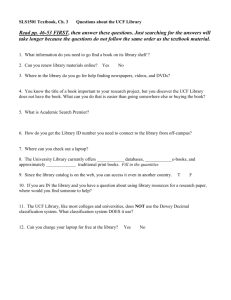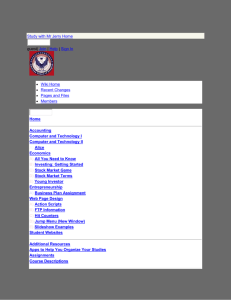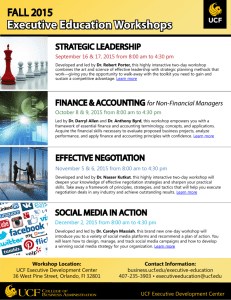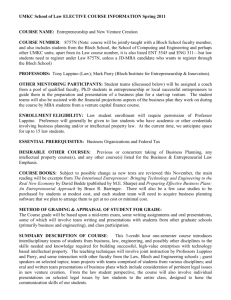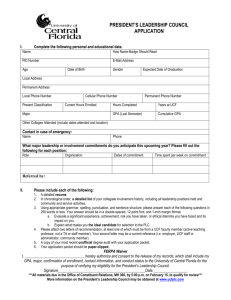Document
advertisement
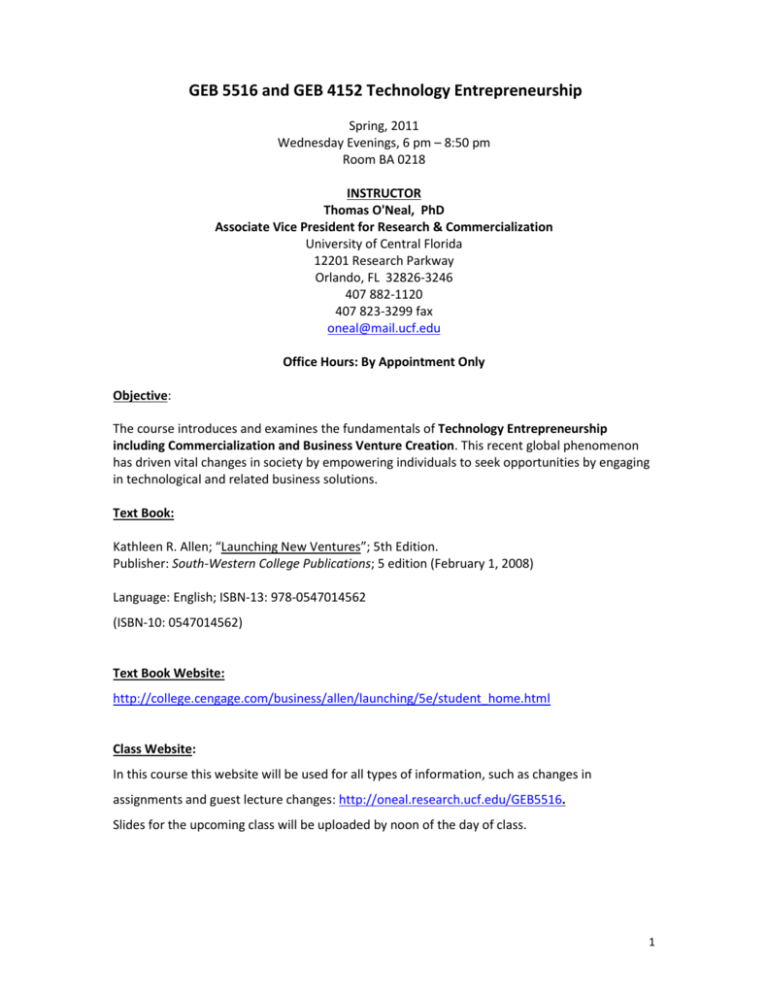
GEB 5516 and GEB 4152 Technology Entrepreneurship Spring, 2011 Wednesday Evenings, 6 pm – 8:50 pm Room BA 0218 INSTRUCTOR Thomas O'Neal, PhD Associate Vice President for Research & Commercialization University of Central Florida 12201 Research Parkway Orlando, FL 32826-3246 407 882-1120 407 823-3299 fax oneal@mail.ucf.edu Office Hours: By Appointment Only Objective: The course introduces and examines the fundamentals of Technology Entrepreneurship including Commercialization and Business Venture Creation. This recent global phenomenon has driven vital changes in society by empowering individuals to seek opportunities by engaging in technological and related business solutions. Text Book: Kathleen R. Allen; “Launching New Ventures”; 5th Edition. Publisher: South-Western College Publications; 5 edition (February 1, 2008) Language: English; ISBN-13: 978-0547014562 (ISBN-10: 0547014562) Text Book Website: http://college.cengage.com/business/allen/launching/5e/student_home.html Class Website: In this course this website will be used for all types of information, such as changes in assignments and guest lecture changes: http://oneal.research.ucf.edu/GEB5516. Slides for the upcoming class will be uploaded by noon of the day of class. 1 Course Overview: Technology Entrepreneurship is an interactive class focused on learning and understanding Leadership, Innovation, Commercialization and Entrepreneurship and involves identifying high impact and high-potential commercial opportunities. The course focuses on gathering resources including talent and capital; and planning, executing and managing value, growth, wealth. This course is designed for those who seek to understand and engage in the entrepreneurial process. This course is relevant to a variety of disciplines including accounting, banking, engineering, finance, investment, management, marketing, technology and science. “Starting a new venture is a process that begins long before the business ever opens its doors. That process is rarely linear but rather a more iterative—even chaotic—process; however, the entrepreneurial process does have direction” Launching New Ventures, 5th Edition; Kathleen R. Allen Guest Lecturers: This course will also include visits from real life entrepreneurs and professional service providers that will come and share their stories and lessons learned and their views on relevant topics surrounding; “Entrepreneurial Perspectives of Today and Tomorrow.” The Text Book includes four major areas of study; Part One: Opportunity Part Two: Feasibility Part Three: Planning Part Four: Growth and Change Course topics, materials and assignments include; - The Entrepreneurial Perspective - Economics, Markets, Finance and Accounting - Opportunity Recognition and Evaluation - Planning and Gathering Resources - Strategy, Execution and Managing Ventures - Entrepreneurship and You - Presentations and Public Speaking - The Future including Technology, Trends and Trade 2 Course work also includes; - Teamwork - Real-time strategy and decision making - Managing change and chaos - Evangelism, selling, negotiation, and motivation through influence and persuasion - Oral and written communication - Aspects of start-up financing, accounting and economics You are expected to attend each class and prepare by (1) completing the assigned readings, homework, research and projects, (2) come to class ready to discuss the major concepts, topics and issues. You will receive the greatest insight and understanding of the subject matter through class discussion, interaction and homework. You are expected to contribute (answer questions and ask questions) to class discussions. Failure to prepare or contribute to class discussions will negatively impact your grade. As part of class discussions and assignments, you will be required to participate in class groups. During most classes, discussion questions, cases, and other work will be assigned to groups and parts of the class will be devoted for group work. >>> Make Sure You Examine and Follow the Class Schedule <<< You are responsible for anything covered in class, whether present or not. It is imperative that you come to class, well prepared, and actively participate during Lectures and Workshops. -- Be Prepared to Perform Research and Present Findings Every Class -- Grades: Your Final Grade will be based on the following elements: Class Participation Assignments, Exams and Quizzes Multiple Individual Projects and Presentations Multiple Group Projects and Presentations Class Participation (10%) Class participation includes on-time attendance, completion of assignments, class discussions, group involvement and feedback. Are you unable to attend a class, please inform the instructor in advance so your lack of attendance will not affect your final grade. 3 Assignments, Exams and Quizzes (20 %) You are expected to complete all required readings and assignments. Homework assignments will be provided throughout the semester. Exams/Quizzes will occur throughout the semester. See the class schedule, the website and pay attention to class announcements for assignments, quizzes and more. Midterm (30 %) Everyone is required to prepare and present their own 2 minute “Elevator Pitch” of an approved opportunity/idea. The opportunity/idea is independent of, and must be different than, the Venture Project assignment. (No multimedia will be permitted for the 2 minute individual presentation.) Final Project (40 %) The Venture Project (V.P.) is a major component of the course. The V.P. is a team project that lasts for the entire semester where students investigate an entrepreneurial opportunity, keeping in mind the key distinctions between an "idea" and an "opportunity". Teams analyze, evaluate, illustrate and document a pressing market need that has potential to be solved with a high technology/high impact product or service. The V.P. includes group papers, plans and presentations. The Venture Project Represents a Significant Part of Your Final Grade and will be based on the composition, clarity and delivery of your work. Areas of Study and Discussion Economics, Markets and Finance Creativity and Improvisation Ideas to Opportunities Intellectual Property, Valuations and Models Team Effectiveness Entrepreneurial Leadership Capital and Cash Flows Initial Public Offerings (IPO’s) Mergers and Acquisitions (M&A) Value, Growth and Wealth 4 Some Useful Websites Office of Research and Commercialization; http://www.research.ucf.edu/ Florida Research and Economic Database; http://fred.labormarketinfo.com/default.asp Disney Entrepreneur Center; http://www.disneyec.com Center for Entrepreneurship and Innovation; http://www.cei.ucf.edu/ UCF Venture Lab; http://venturelab.ucf.edu/resources.html UCF Business Incubation Program; http://www.incubator.ucf.edu/ Small Business Administration; http://www.sba.gov UCF Institute for Economic Competiveness; http://www.bus.ucf.edu/hitec/index.shtm So what? Who cares? Why you? Tool shed; http://wendykennedy.com/toolshed/ Elevator Pitch Examples; http://www.yourbusiness.msnbc.com Business Owners’ Toolkit; http://www.toolkit.com/ Financial Calculators; http://www.javacalc.com/ Academic Honesty Policy: All students are expected to conduct themselves according to the academic behavior standards published in the UCF student handbook. Violations of the policy will be dealt with in the strictest manner. Confidentiality Policy: Throughout this course you will be exposed to proprietary information from other students, guest speakers, faculty and advisors. All such information is to be treated as confidential. By enrolling in this class, you agree to not disclose this information to any third parties without specific written permission from the provider of the information. You further agree not to utilize such proprietary information for your own personal commercial advantage or for the commercial advantage of any third party. Any breach of this policy will be interpreted as a violation of academic integrity and will be addressed as described in The Golden Rule. UCF, The College of Business Administration, the Office of Research and Commercialization and the Center for Entrepreneurship and Innovation disclaim any responsibility for the protection of intellectual property of students, guest speakers, faculty and advisors who are involved in entrepreneurship education, research and/or outreach activities. 5 GEB 5516 and GEB 4152 Technology Entrepreneurship Semester Schedule Spring 2011 DATE The Weekly Agenda Lectures and Workshops 12-Jan-11 Kickoff 19-Jan-11 Chapter 1 and 2 26-Jan-11 Chapter 3 and 4 2-Feb-11 Chapter 5 and 6 9-Feb-11 Chapter 7 16-Feb-11 Chapter 8 and 9 23-Feb-11 "Elevator Pitches Begin" 2-Mar-11 "Elevator Pitches Conclude" Class Topics The Beginning…>>> Show Up >>> Welcome and Introductions "Getting Up For The Challenge" Understanding Entrepreneurship Preparing for the Entrepreneur Journey Recognizing and Creating Opportunity Developing a Business Model Conducting a Feasibility Analysis Analyzing the Industry and Market Analyzing Product/Service Risks and Benefits The Founding Team Analyzing Start-up Financials "Elevator Pitches Begin" Comments Stay Current on Your Reading Assignments Be Prepared to Perform Research and Present Findings Every Class * Keep A Venture Journal * (Use the Check List at the End of Every Chapter) Submit Final Venture Project Team Members "Elevator Pitches Begin" "Elevator Pitches Conclude" "Elevator Pitches Conclude" 9-Mar-11 SPRING BREAK SPRING BREAK SPRING BREAK 16-Mar-11 Chapter 10, 11 and 12 Submit Final Group Venture Project 23-Mar-11 Chapter 13 and 14 30-Mar-11 Chapter 15 and 16 Building an Effective Business Plan Legal Forms and Ethics and Responsibility Designing an Entrepreneurial Organization Managing Operations Develop Entrepreneurial Marketing Plan Funding a Start-up Ventures Funding a Rapidly Growing Venture Growth and Change Workshops,Presentations,Recommendations Finals Finals Formal Business Presentations Formal Business Presentations 6-Apr-11 Chapter 17, 18 and 19 13-Apr-11 Market/Industry Reviews 20-Apr-11 Final Group Presentations 27-Apr-11 Final Group Presentations 6
